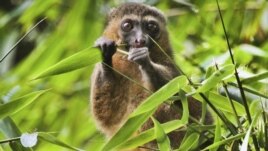10 June 2020
Scientist Carlos Ruiz has spent 25 years working to save golden lion tamarins. The long-haired monkeys that live in Brazil's Atlantic Forest are endangered.
His project to regrow the wooded area that is home to the monkeys helped the population increase. Success seemed possible.
Then, in 2018, the disease yellow fever spread in Brazil, killing almost 30 percent of the golden lion tamarins. Ruiz and his team decided there was only one way possible to save the animals: a yellow fever vaccination program to start in the spring of 2020.

This 2019 photo provided by Noel Rowe and Centre ValBio shows a golden bamboo lemur in Madagascar. (Noel Rowe/Centre ValBio via AP)
But, in late December the new coronavirus appeared and quickly spread around the world. The health crisis led to suspensions and shutdowns of much of human industry, including wildlife conservation.
Some members of Ruiz's team were placed in quarantine. Then in April, Brazil's government closed national parks and protected areas, barring even researchers from the area where the monkeys live.
Ruiz is president of the non-profit Golden Lion Tamarin Association.
"We hope that we ... can still do our work before a second wave of yellow fever hits."
Emergency measures to stop COVID-19 closed national parks, leaving the life inside unprotected. Illegal land clearing and hunting has increased. The closures of parks and travel bans also meant a big drop in financial support for all kinds of environmental operations.
Stuart Pimm is the founder of the organization Saving Nature, and a scientist with Duke University. He says scientists and conservationists have faced difficulties created by natural disasters, political conflicts and other events before.
"But," he said, "I can't think of another time when almost every country on the planet has faced the impacts of the same big disaster at once."
Guatemala is an example. Its native rain forest communities are struggling to contain one of the worst fire seasons in 20 years. The costs of dealing with the coronavirus crisis has shrunk the budget for firefighting operations, however.
"Ninety-nine percent of these fires are started by people" who want to clear the space to raise cows, said Erick Cuellar. He is the deputy director of the Association of Forest Communities of Petén. Petén is home to the Maya Biosphere Reserve, a protected area.
Native people are volunteering as firefighters, but many are also struggling because they have lost their jobs because of the coronavirus.
"We're losing rare flora and fauna," said Jeremy Radachowsky. He is director for Mesoamerica at the organization Wildlife Conservation Society. He added that the problem is caused by "reduced enforcement of environmental laws."
In many African countries, wildlife tourism provides the money to keep up parks where many endangered species live, such as elephants and giraffes.
But after the coronavirus appeared, tourism ended, said Peter Fearnhead. He is the CEO of the group African Parks. It operates 17 national parks and protected areas in 11 countries.
In addition to the money that was lost this year, Fearnhead said next year's tourism may be only at 50 percent the levels seen before COVID-19.
Patricia Wright notes that environmental work needs relationships with communities. Wright is a scientist at Stony Brook University in New York. She has spent 30 years building a program to study and protect the lemurs of Madagascar.
Now as tourism decreases, she is just aiming to keep her more than 100 workers employed.
The current plan is to produce travel videos about Madagascar to sell to tour operators and schools looking for online science material.
"We have to get through the year," she said.
I'm Susan Shand.
The Associated Press reported this story. Susan Shand adapted it for Learning English. Caty Weaver was the editor.
________________________________________________________________
Words in This Story
quarantine – v. to be put in isolation because of an infectious disease
tourism – n. to visit a place for enjoyment
impact – n. the effect or outcome of something
flora – n. the flowers that grow in a certain place
fauna – n. the animals that live in a certain place